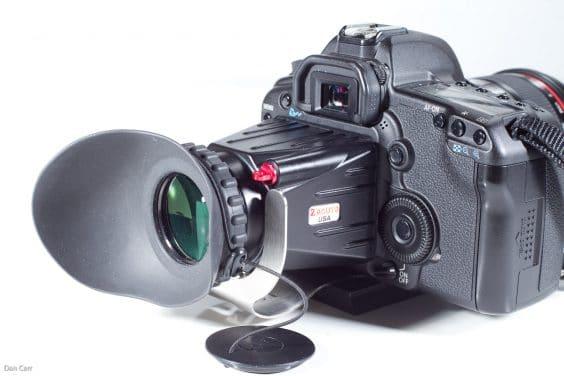Introduction
Theviewfindercanbedividedintoanopticalviewfinderandanelectronicviewfinder.Theopticalviewfinder,asthenameimplies,completestheviewfinderworkthroughopticalcomponents.Accordingtothedifferentworkingprinciple,itisdividedintotherangefindertypeandthesinglelensreflexcoaxialtype.Inconsumer-gradedigitalcameras,therangefinderviewfinderisthemostcommon.Thisviewfindermethodissimpletoputitbluntly.Itistoopenaholeabovethelensandinstallglassonthefrontandbacksothatthephotographercanseethepersontobephotographedthroughthishole.Orthings.Althoughtherangefinderviewfinderisnotthatsimple,italsohasfunctionssuchaszoomglassandfocusassistline,buttheoverallstructureisverysimple.Becauseofitssimplestructure,thecostisrelativelylow,soitisusedinalargenumberoflow-enddigitalcameras.However,therangefinderviewfinderalsohasitsshortcomings.Becauseitisnotdirectlythroughthelens,theimagethatthephotographerseesfromtheviewfinderandtheimageonthefinalphotowillhaveacertaindegreeofdeviation.WhenshootingcloseobjectsItisespeciallyobviousthatthisisnotconducivetothecompositionandframingofthephotobythephotographer.Thesingle-lensreflexstructureismuchmorecomplicated,sothemanufacturingcostisrelativelyhigh,anditisgenerallyusedinhigh-endproducts,whichiscommonlyreferredtoasadigitalsingle-lensreflex(DSLR).Thesingle-lensreflexviewfinderisdirectlythroughthelens,thelightentersfromthelens,throughamirror,refractedtotheupperfocusingscreenforimaging,andthenrefractedintotheeyepiece,sothatthephotographercanseewhathewantsfromtheviewingframeSincethecapturedimageisdirectlythroughthelens,theproblemofimagedeviationissolved,andtheeffectof"seeingiswhatyouget"istrulyachieved.
Comparedwithelectronicviewfinders,opticalviewfindershavetheadvantageofrealopticalviewfinders,whicharemoresuitableforsportsviewfinders.Electronicviewfinderswillappeartailingwheninmotion.
Theopticalviewfinderaddsananti-fogfunctiontotheviewfinderlens,sothatitwillnotappearfoggywhenusedinwinter.
Viewfindermethod
Asthenameimplies,theopticalviewfinderisacompositionthatthehumaneyeobservestheviewfinderthroughasetofopticalmechanismsonthecamera.Intheopticalviewfinder,therearetwotypesofviewfinders,theparaxialhead-uptypeandthesingle-lensreflexcoaxialtype.Amongconsumer-gradedigitalcameras,camerasusingrangefinderhead-upviewfindersarethemostcommonandcommon.Whatkindofviewfinderisarangefinderhead-upviewfinder?Infact,itisnotcomplicatedatalltosayit,itiswhatweoftencalltheviewfinderwindowofthe"stupidmachine".Let’stakethefamousCANON’sPOWERSHOTG2cameraasanexample.Itusesafairlytypicalrangefindersystem.WhenshootingwiththeG2,thelightofthesubjectbeingshotdirectlyenterstheviewfinderwindowonthefrontofthecamera,andthenenterstheeyesoftheobserverfromtheviewfinderwindowonthebackofthecamera.Therouteissimpleandclear.Toputitbluntly,itisalmostassimpleasopeningasmallholeinthecamerabodyandinstallingglasssothattheeyescanseethesceneryaheadthroughthecamerabody.AlthoughtheviewfinderstructureoftheG2isactuallynotsosimple,thereareauxiliarylinesforviewing,zoomlensesandothercomponentsinside,butoverallthestructureisrelativelysimpleandtheprincipleisnotcomplicated.Becauseofthis,thesizeoftherangefinderhead-upviewfinderisrelativelysmallandthemanufacturingcostisnothigh,soitiswidelyusedbyvariousdigitalcameramanufacturers.
However,becausethepositionoftheviewfinderwindowandthelensofthecamerausingtherangefinderhead-upviewfindercannotbethesamebutseparate,thesizeandpositionoftheimageseenintheviewfinderandtheactualelectronicimagetakenTherearecertaindifferences,andthisdifferenceiscalled"parallax"inphotography.Thiskindofparallaxisnotabigproblemwhenshootingdistantscenes,butwhenshootingclose-upscenes,theviewingrangeandthefinalimagingangleareoftendifferent,andthecompositionisnotcorrect.Fromaphotographicpointofview,thisisnotconducivetoreallydoingagoodjobinframingandcomposition.
Inordertosolvethisproblem,somedigitalcameramanufacturersapplythesingle-lensreflexcoaxialviewfindertechnologywidelyusedintraditional135camerastoconsumer-levelDCs.Single-lensreflexcoaxialviewfindercamera,referredtoas"SLRcamera".Fromtheappearanceofthefrontofthecamera,youcan'tfindotherviewfinderwindowsexceptthelensitself.Sohowdoesitwork,ifthelightofthesubjectistransmittedtotheoperatorbehindthecamera?Let’stakeOLYMPUS’sE-20digitalcameraasanexample:Thelightfromthescenebeingshotpassesthroughthelensandreachesamirrorinsidethecamera.Theviewingwindowonthebackpassesintothehumaneye.TheframingstructureoftheSLRcameraensuresthatthescenethatpeopleseewhenframingisexactlythescenethatwillbetakenthroughthelensdiagonally.Toparaphrasethecomputerindustry,itisexactly"whatyouseeiswhatyouget".Moreover,whetherthecameraisfocusingaccuratelyandthechangeinfocallengthcanalsobeclearlyseenthroughtheviewfinder.Sincetheviewingrangeofthesingle-lensreflexcoaxialviewfinderisbasicallythesameastheactualshootingrange,thereisnoparallaxphenomenonthattherangefinderhead-upviewfindercarries.Suchaviewfinderiscertainlyveryconducivetophotography,allowingustointuitivelyviewandcomposeimages.Atthesametime,acamerawithaSLRviewfindercangenerallyseethecamerashootingparametersintheviewfinder.
LCDviewfinder
Thisisanecessaryviewfindermethodformostdigitalcameras.TheonlyadvantageofLCDviewfinderistocorrecttheonlydisadvantageofordinaryopticalviewfinder.However,itjustlikeWindows98,itfixesthebugsofWindows95andgeneratesmorebugs.Let'slookatthedisadvantagesofLCDviewfinder:firstly,LCDisabigpoweruser,ittakesupmorethan1/3ofthepowerofthewholecamera;secondly,thepostureofLCDviewfindermustbewithhandsforwardandkeepingacertaindistancefromtheeyes.Atthistime,thecameracannotgetit.Stabletrianglesupport,itisdifficulttotakestableandclearphotoswithaslowshutterspeed.Finally,thecolorandcontrastofthescreendisplayedontheLCDhavealargeerrorwiththeactualimageseenonthecomputer,andeventhenominalmegapixelLCDItseemsthatthepictureisstillveryrough,anditisimpossibletoobservethedetailsofthesubject.Facedwiththiskindofpicture,itisdifficulttojudgewhetherthephotosyoutakemeetyourrequirements.Fortunately,digitalcamerasarealmostequippedwithordinaryopticalviewfinderandLCDviewfinderatthesametime.IfyoubuyadigitalcamerawithonlyanLCDviewfinder,thereisacertainrisk,unlessyouaresureenoughtogetthedesiredeffect.
AdvantagesandDisadvantages
Advantages:Theeyesocketsarecalledtoleanontheviewfinder,andthemovementrangeissmallwhenframing,whichisgoodforholdingthecamerasteady.Theviewfinderdoesnotrequireelectricity,andthecamerasaveselectricity.
Disadvantages:Thereisaparallaxbetweentheviewingrangeandtheactualshootingrangeofthelens,thatis,whatyouseeisnotnecessarilywhatyouget.Whenshootinglong-distanceobjects,theerrorissmallandcanbeignored,butforclose-upshooting,theparallaxoftheviewfinderisgreater,andtheclosertheshootingdistance,thegreatertheparallax.
Use
1.Hand-heldcameratoshootfarawayscenery,generally2metersaway,itisbesttouseopticalrangefinderviewfinder,becausethereisnoobviousparallax,andcansaveenergy.2.Inordertoavoidframingerrorswhenshootingatcloserange,itisbesttousetheLCDscreenforframing.Ifconditionsdonotpermitit,suchassmallandcrowdedscenes,itisinconvenienttousethedisplayscreentoview,thenattentionshouldbepaidtoreducetheviewfinderareaormovetheviewfinderframeappropriatelyafternormalviewfindertocompensateforparallax.
3.Whenshootingverycloseobjectsinclose-upmode(macrophotography),onlytheLCDmonitorcanbeusedforframing.
4.Inordertoavoidobstructionssuchasrailingsinfrontofthecamerawhenshootingbirds,flowersandgrassinthefence,sometimesitisnecessarytostretchthecameraintothefencetoshoot,butourheadscan’tgetintoit.ItismuchmoreconvenienttousetheLCDscreentoviewtheview.
5.FromtheperspectiveofprolongingthelifeoftheLCDscreenofadigitalcamera,usetheopticalviewfinderasmuchaspossibleifyoucanuseit,becausethecontrolpaneloftheLCDscreenandthelightingsourcehaveacertainservicelife.
Precautions
Usetheopticalviewfindertoshoot

Parallaxphenomenon
Pleasenote:therearedifferencesbasedonthepositionoftheviewfinderandlens,Theareaseenintheopticalviewfinderisslightlydifferentfromtheactualimagearea,whichiscalledparallaxphenomenon.Thisphenomenonwillbecomemoreobviousifthedistancebetweenthesubjectandthelensiscloser.Insomecases,thepartoftheclose-upimagedisplayedintheviewfinderwillnotappearintherecordedimage.ItisrecommendedtousetheLCDmonitorforclose-upshots.
Classification
Therearetwotypesofopticalviewfinders.Oneisseparatefromthelensandisgenerallycalledopticalviewfinder(usedbypoint-and-shootcamerasinthepast),andtheotheristhroughthelens.IsgenerallycalledTTLviewfinder(mostlyusedinSLRcameras)
ComparedwithLCDviewfinders,thefirsttwoviewfindershavemanyadvantages.Firstofall,youcanavoidexcessivepowerconsumptionduetoturningontheLCD,whichcanincreasetheshootingtimeandbatterylife.Secondly,whenshootingoutdoors,itcanavoidframingerrorscausedbyreflectionsontheLCDscreen.Adetailedcomparisonofthedifferencesbetweenthesethreeviewfinders:
1.Opticalviewfinder
Nomatterwhetherthecameralensisfixedfocusorzoom,theviewfinderoftheopticalviewfinderisnotIthasnothingtodowiththelenswhenitworks,itjustimitatestheangleofviewandfocallengthofthelens.Somehouseholdpoint-and-shootcameras(includinghousehold-leveldigitalcameras)mostlyusethisviewfindermethod.
Thesizeofthelightholeintheviewfinderdeterminestheclarityoftheimage.Foruserswhowearglasses,itismoreimportanttohavearelativelylargelighthole,becausetheglasseswillmaketheirTheeyesarefarfromtheviewfinder,soitisimpossibletoframetheviewaccurately.Someviewfindersareequippedwithadiopteradjustmentfunction,sothatthephotographercantakeamoreaccurateviewwithoutwearingglasses.However,onlynear-sightedandfar-sightedpeoplecanperformdiopteradjustment.Forphotographerswithnormalvision,diopteradjustmentismeaningless.
Theopticalviewfindershouldbeascloseaspossibletothecenteroftheopticalaxisofthelenstoreduceviewfinderparallax.Theparallaxoccursbecausethecameralensandtheviewfinderviewthesubjectfromdifferentpositions,sotherearesomedifferencesinthescenerytheysee.Generallyspeaking,theopticalviewfindercannotdisplay100%oftheimagetakenbythelens,andprobablyonly85%orlessoftheactualframe.ThisiswhytheTTLviewfinderwasdeveloped.
2,TTLopticalviewfinder
Thisviewfinderisusuallyequippedwithmoreexpensivedigitalcameras,whichcandisplaytheimagestakenbythelens.Intraditionalfilmcameras,mostofthemhaveadoptedthisviewfindermethod.
DifferentTTLviewfindersystemsworkdifferently.Inspecificuse,thedetailsthatcanbedisplayedarealsodifferent,buttheyallreflectorscatterthelightpassingthroughthelenstoachieveThepurposeofframing.Therefore,foradigitalcamerausingaTTLopticalviewfinder,theimagesseenthroughtheLCDscreenandtheviewfinderarethesame.
3.Electronicviewfinder
TheadvantagesofthisviewfinderarethesameastheTTLviewfinder:itdisplaysthefullpictureofthescenetobephotographed,whichcanbeseenindaylight,anditcandisplaytheaperture,Shootinginformationsuchasshutterspeed,butinaddition,youcanalsodisplaythecameramenu,whichisnotpossiblewithotherviewfinders.
Theshortcomingsofelectronicviewfinderscanbesummarizedintothree:differentfromopticalviewfindersandTTLviewfinders,itrequiresalotofpower;similartoLCDscreens,itiseasytoreflectlight,whichaffectstheaccuracyofviewfinder;Thesystemisrelativelyroughcomparedtoit.Thelastitemisveryimportant,becausesuchasystemcannotdisplaythesmallestdetailsintheshotframe,suchaswhetherthehumaneyeisopenornot.
Whataretherequirementsanddifferencesbetweenthephotosensitiveelementsofdigitalcameras?
Non-professionaldigitalcamerasusealensintegratedwiththebody,usinganinter-lensshutter.Theshuttercanbenormallyopenedbeforetheofficialexposure,andthenclosedbeforetheofficialexposure.Normallightcanreachthephotosensitivedevicedirectly,soitcanbeeasilyRealizeLCDframing.
Professionaldigitalcamerasaremostlybasedontraditionalcamerabodydesign.Withthefocalplanecurtainshutterandthemirror,thelightcannotreachthephotosensitivedevicebeforetheformalshooting,soitisnoteasytoachieveLCDframing.Moreover,itisnotnecessaryforrealSLRmodelstoviewtheLCD.Inaddition,forprofessionaldigitalcameraswithinterchangeablelenses,howtokeepthephotosensitivecomponentscleanhasalwaysbeenaproblem.Iftheshutteriskeptopen,thisproblemwillbeevenmoreserious.
Viewfinder
Theviewfinderisthepartofthedigitalvideocamerathatmonitorstheimagethroughtheeyepiece.Theeyepieceviewfinderofthedigitalvideocameraonlyhasablackandwhiteviewfinderandacolorviewfinder.Device.Butforprofessional-gradedigitalcameras,theyareallblackandwhiteviewfinders,becausetheblackandwhiteviewfinderismoreconducivetothephotographertocorrectlycomposethepicture.TheviewfinderofadigitalvideocamerahasthesamestructureasitsLCDscreen,bothofwhichuseTFTliquidcrystal,butthedifferenceliesinthesizeandpowerconsumptionofthetwo.
Definition
Viewfinder
Theviewfinderofageneraldigitalvideocameraisrelativelysmall,onlyenoughfortheusertocloseoneeyetoobserve;Forsomeprofessionalmodels,orsomeshoulder-mountedDVs,theviewfinderpixelsareevenlargerthantheLCDscreen,whichmakesiteasierforthephotographertoseetheshootingpicture.ComparedwithitsLCDscreen,theviewfinderhasanotheradvantage,whichispowersaving.Generallyspeaking,whentheLCDscreenisturnedoff,onlytheviewfindercansaveatleastaquarterofthetime.
Theviewfinderofadigitalvideocameracangenerallyberotatedintheverticaldirection,andinsomecases,therotationanglecanbeupto90degrees,whichismoreconvenientforthephotographertoshootwhilestanding.Moreover,mostviewfinderscanchangethedistanceoftheeyepiece,whichisconvenientforphotographerswhowearglassesformyopia.Ingeneral,forprofessionalphotography,theviewfinderisstillaveryimportantpart,sowelookatthoseprofessionalDV,theviewfinderisverygoodintheworkmanship,whichisdesignedfortheconvenienceofprofessionalphotography.
Mainindicators
Viewfinder
Theviewfinderhastwomainindicators:viewfindermagnification(referredtoasviewfindermagnification)andViewingrange.
Theviewfindermagnificationreferstotheratiooftheopeningangleofthesubjecttotheeyewhenobservingthesubjectthroughtheviewfinderandtheopeningangleofthesubjecttotheeyedirectlyobservingthesubjectthroughtheeye,thatis,thesubjectseenthroughtheviewfinderTheratiobetweenthesizeandthesizeofthesubjectdirectlyseenwiththeeyes.Theframingmagnificationislargeandthevisualangleissmall,andthesceneseenduringframingisclosetotheoriginal,withastrongsenseofreality;theframingmagnificationissmall,andthevisualangleislarge,makingiteasytoseethepanoramawhenframing.Ifthemagnificationistoosmall,itisdifficulttoobservethedetailsoftheobject,whichisnotconducivetothecompositionandfocus,andtheobjectimageisverydifferentanduncomfortablewhenframing.Themagnificationisgenerallylessthan1X,mostlybetween0.75Xand0.95X.
Theviewfinderrangereferstotheratiooftherangeofthesceneryseenthroughtheviewfindertotherangeofthesceneryshotonthefilm,expressedasapercentage.Generally,thepictureseenintheviewfinderisnotexactlythepicturetaken,itisalwayssmallerthanthepicturetaken,usually90%to100%.Therefore,SLRbasicallyavoidsparallax.Onlywhentheviewingrangereaches100%canitbecallednoparallax.Usuallyonlyprofessionalmodelshave100%viewingrange.
